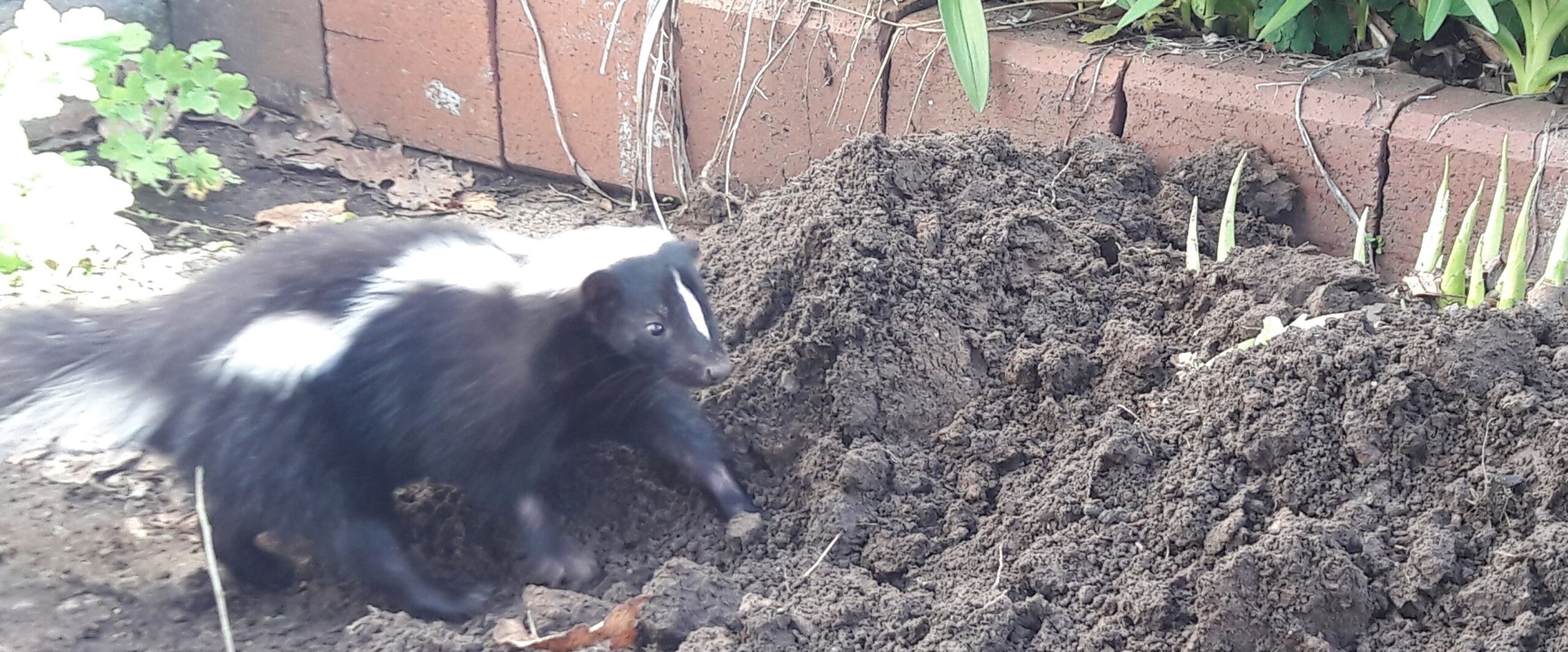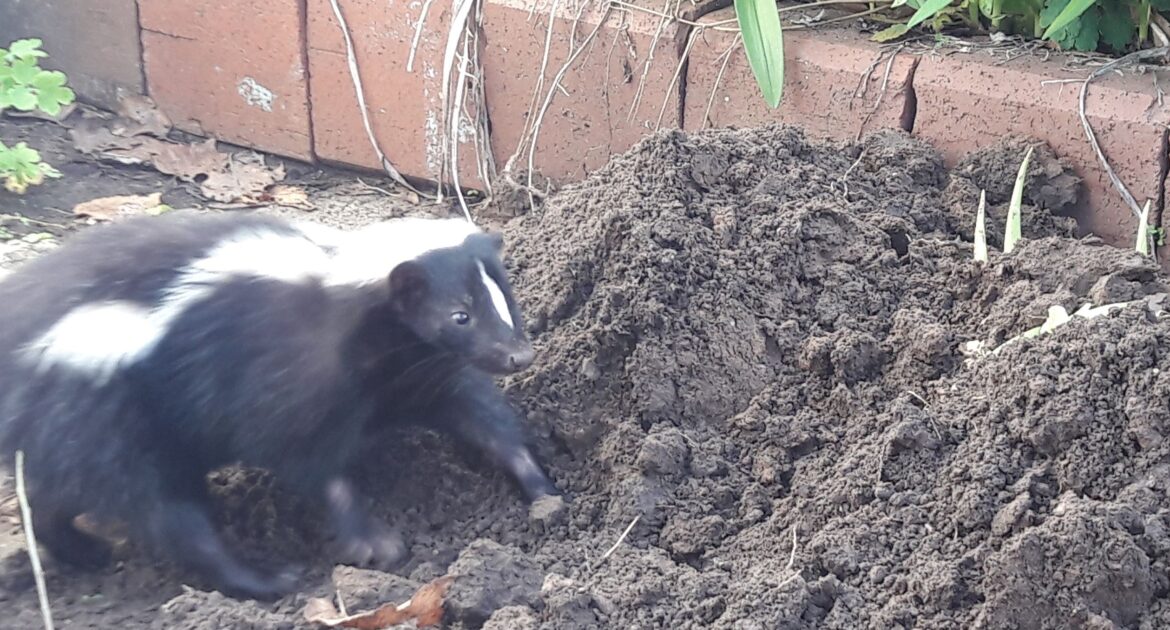When we think of skunks, our first thought is usually their notorious spray, not their potential as emotional support animals. Yet, a support skunk viral story recently captured attention, proving that even skunks have a softer, surprising side. A post on Reddit shared by user CoffeeMilkLvr detailed how a retirement home invited a skunk named Meadow as an emotional support animal. The photos of Meadow melted hearts, earning tens of thousands of upvotes and comments from users who couldn’t stop praising her unusual role.
While this viral skunk controversy has sparked plenty of conversation about skunks as pets and their benefits, we need to take a closer look at what skunks bring into a home. If you’ve dealt with skunks entering your property uninvited, you already know the struggles they can bring. Beyond their infamous spray, skunks can leave behind significant messes.
Cleaning up their nesting materials, droppings, or any damage they cause is essential—not only to restore cleanliness but to prevent bigger problems. Health risks, foul odours, and even structural damage can arise if the mess isn’t handled properly. That’s where we at Skedaddle Humane Wildlife Control in London step in to help.
But what’s the deal with this support skunk story? And why are skunks best left outside of homes, despite their cute reputation?
The Support Skunk Viral Story
The story of Meadow, the support skunk, hit Reddit like a wave. Users fell in love with the idea of a skunk offering companionship, especially to elderly residents in a retirement home. According to Kristen Jacobsen, a clinical professional cited in Newsweek, emotional support animals (ESAs) like Meadow can provide comfort, connection, and calm to individuals dealing with loneliness or anxiety.
Jacobsen explained how the presence of an ESA creates positive emotional experiences through the release of oxytocin. Skunks, with their calm demeanour and non-threatening nature (when tamed and trained), can greatly benefit people seeking emotional security. Meadow’s story even sparked comparisons to other ESAs like dogs and cats, with some wondering if skunks might be the next big thing in therapeutic animals.
However, this story is met with understandable skepticism, creating a viral skunk controversy. While Meadow might thrive as an ESA in a controlled environment, that doesn’t mean skunks are a practical choice for the average home. Trained or not, they come with challenges that make domestic settings less than ideal.
Why Skunks as Pets Can Be Problematic
The idea of keeping skunks as pets might seem charming on platforms like Reddit, but it’s rarely a good idea. Even in the best circumstances, skunks are not well-suited for life indoors. Here’s why they make more sense as visitors to retirement homes than permanent housemates for most people.
They Mark Their Territory
Even though a trained skunk like Meadow might not spray unless feeling threatened, skunks still mark their territory in other ways. They have natural scent glands that produce strong smells, and even mild “marking” can make your home smell unpleasant over time. The odour can cling to carpets, curtains, and upholstered furniture, making it tough to fully get rid of without a deep clean. This creates a long-term problem that simple air fresheners or home cleanups won’t fix. Removing skunk odours often requires special equipment or professional cleaning services.
Skunks Can Cause Damage
Skunks dig burrows when they nest, and this behaviour doesn’t stop when they’re indoors. Outdoors, they might tunnel under porches, sheds, or steps, creating structural problems. Indoors, their strong claws and sharp teeth can ruin furniture or carpeting, and they may chew through cords or create scratches on wooden floors. Their natural instincts make it hard for them to live inside without constantly causing some kind of damage, even when they don’t mean to.
Potential Health Concerns
Like many wild animals, skunks can carry diseases that put people and pets at risk. They are known to spread rabies, which can have serious consequences if not addressed quickly. They can also carry parasites like fleas or ticks and spread bacteria through their droppings. Even a tame skunk isn’t completely safe from these health concerns unless it receives specialized veterinary care, which is often hard to find or expensive.
Long-Term Care Challenges
Caring for a skunk is no easy task, even for people with experience with wildlife. Skunks require specific diets to stay healthy and aren’t satisfied with the kinds of food you’d feed most pets, like dogs or cats. They are also nocturnal, meaning they’re awake and active when most people are trying to sleep. Their need for attention, exercise, and mental stimulation can quickly overwhelm families who aren’t fully prepared for the commitment. Without proper care, skunks can become stressed or unhealthy, adding to the challenges.
While Meadow shines as a trained support animal in a specific setting, skunks as pets are not practical or safe for everyday homes. They may be adorable and fascinating in curated environments, but skunks are best enjoyed from a distance in places where they can thrive without disrupting everyday life.
Why Cleanup Is Key After a Skunk Infestation
When skunks enter properties uninvited, they leave more than just bad odours behind. Infestations can harm your home and health. After any skunk activity, professional cleanup becomes vital. Here’s why.
- Health Hazards: Skunk droppings and nesting materials can spread harmful bacteria or parasites like roundworms. If left untouched, these harmful agents may end up contaminating surfaces or even the air in your home.
- Lingering Odours: Skunks are known for their spray, but their musk and nesting materials carry strong smells, too. Without deep cleaning, those odours can seep into carpets, walls, and furniture, making it harder to feel comfortable in your home.
- Attract Other Animals: Skunks often attract other wildlife. Remaining scents or food sources can invite other unwanted guests, creating an ongoing infestation problem.
This is where our team comes in. We specialize in thorough wildlife removal using humane methods, like our one-way doors. These allow skunks to leave your property safely while preventing them from getting back in. Once the animals are gone, we ensure all signs of their presence are eliminated, making your home clean, safe, and odour-free.
Meet Skedaddle Humane Wildlife Control in London
For homeowners in London, where skunks are common neighbourhood visitors, wildlife control is no small matter. Skedaddle brings years of experience and expertise to handle situations like skunk infestations. Our effective one-way door systems ensure skunks can leave your property, but not return.
More importantly, we prioritize cleanups that protect your home from future problems. By addressing odours, droppings, and potential damage right away, we prevent long-term issues and give you the peace of mind you deserve.
What We Can Learn From the Support Skunk Viral Story
While Meadow’s role in the retirement home was a joy to many, her story reminds us that skunks are still better off living outdoors. Stories like this help humanize skunks in ways that make us less fearful of them and also illuminate the unique challenges they present.
For homeowners in London, the takeaway from this support skunk viral story is clear: when skunks make themselves unwanted guests, it’s crucial to address the problem properly. Keep in mind that while internet stories make skunks seem cute and approachable, they’re still wild animals.
If a skunk has made its way onto your property or you’re noticing the signs of a past infestation, don’t wait for the problem to grow. Skedaddle Humane Wildlife Control in London is here to help with professional removal and cleanup services. Contact us today to request an estimate and reclaim your home.




